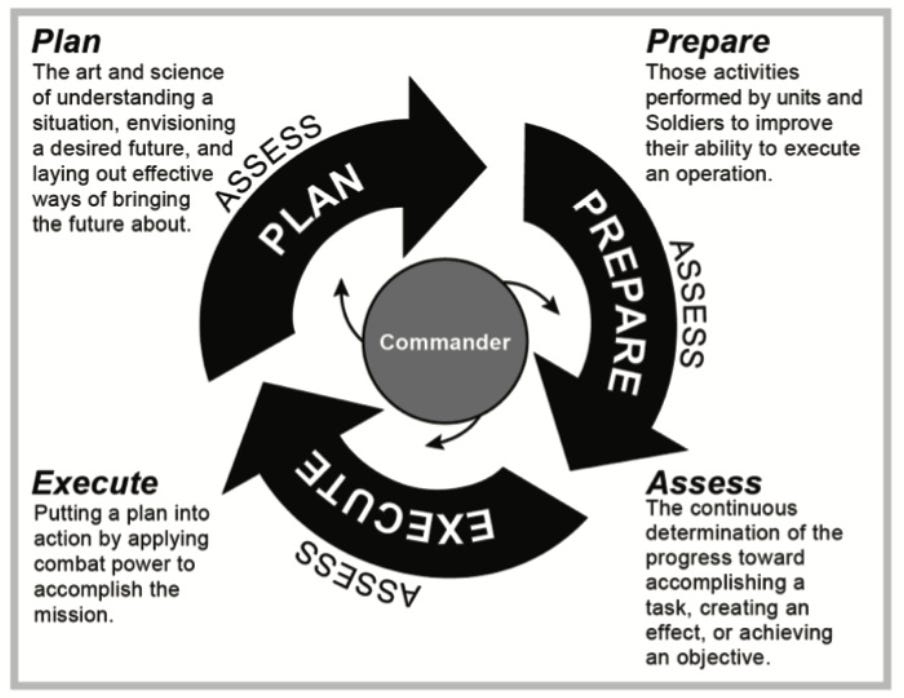
How do you assess your life?
Borrow One Idea: MoPs Versus MoEs
Assessment inspires anxiety. Grades, test scores, and performance evaluations are the formal assessment tools that govern our lives. External, top-down, measures of performance. Are you doing good or not, right now?
Informal assessment, whether professional or personal, is also necessary, and generally disliked. There is something about evaluation, whether external or self-driven, that humans prefer to avoid. It’s pride, right? We do not want to hurt our pride.
In the military, the downside risk to honest, rapid, thorough, action-oriented assessment is losing a battle, a war, or your life. Pride plays no part: you continuously assess and compare desired outcomes with actual events to help make better decisions, or you lose.
Within this logic, assessment makes sense, without the anxiety of personal pride. The scope is wider than an individual, the plot arc is longer than the last performance period.
Much like your life.
To embrace assessment you must appreciate that it is as much for telling you where you’ve been (and how you’ve done) as it is for telling you where you are going (and what is needed to get there).
Appreciating the difference between measures of performance (MoPs) and measures of effectiveness (MoEs) helps with this.
A measure of performance is an indicator used to measure a friendly action that is tied to measuring task accomplishment (JP 5-0). MOPs help answer questions such as “Was the action taken?” or “Were the tasks completed to standard?” A MOP confirms or denies that a task has been properly performed. ... MOPs help to answer the question “Are we doing things right?”
…
A measure of effectiveness is an indicator used to measure a current system state, with change indicated by comparing multiple observations over time (JP 5-0). MOEs help measure changes in conditions, both positive and negative. MOEs help to answer the question “Are we doing the right things?”
ADP 5-0, Sections 5-15 through 5-17, PDF page 77
Our world is full of measure of performance indicators, but they tell us the least. Measure of effectiveness indicators require more thought in development, time in observation, and thoughtfulness in the resulting decision-making…but they tell us what we need to know.
Measures of performance prompt point solutions: go fix them.
Measures of effectiveness prompt better decisions: change the course.
This week, borrow with pride and put into action deeper reflection on how you assess life and whether you are doing the right things. Where are you focusing your assessment activities and are you gathering the information you need to make better decisions? How will you improve your assessment-to-action cycle time?
Get Familiar With: The Operations Process - Assessment
One word appears with more frequency then all others in the US Army’s visualization of the operations process: assess.
Planning, preparation, and execution are, at their core, a series of decisions a leader needs to make.
Assessment is a continuous activity of the operations process that supports decision making by ascertaining progress of the operation for the purpose of developing and refining plans and for making operations more effective. Assessment results enhance the commander’s decision making and help the commander and the staff to keep pace with constantly changing situations.
ADP 5-0, Sections 5-1, PDF page 75
How do you assess your life? Is assessment a continuous activity in your life’s operations? When you feel that you’ve appropriately assessed a situation, do you translate the learnings into recommendations and actions?
The Guided Discovery for this week will explore the activities related to Assessment (within the Operations Process), the criticality of action-oriented assessment, and how to better structure how you assess your life.
Learn More: Suggested Reading
ADP 5-0, The Operations Process
Pages 5-1 through 5-8 based on printed document (PDF pages 75-82)
An overview of assessment in the Operations Process
These materials will be the focus of Thursday’s Guided Discovery
Catch Up: Last Week’s Content
Study: First to Paper
Guided Discovery: The Operations Process - Execution
Always be asking:
1. What is the connection with my leadership development?
2. How does this change my thinking on management?
3. How does this influence planning for life?
4. What can I borrow with pride to use this week?



